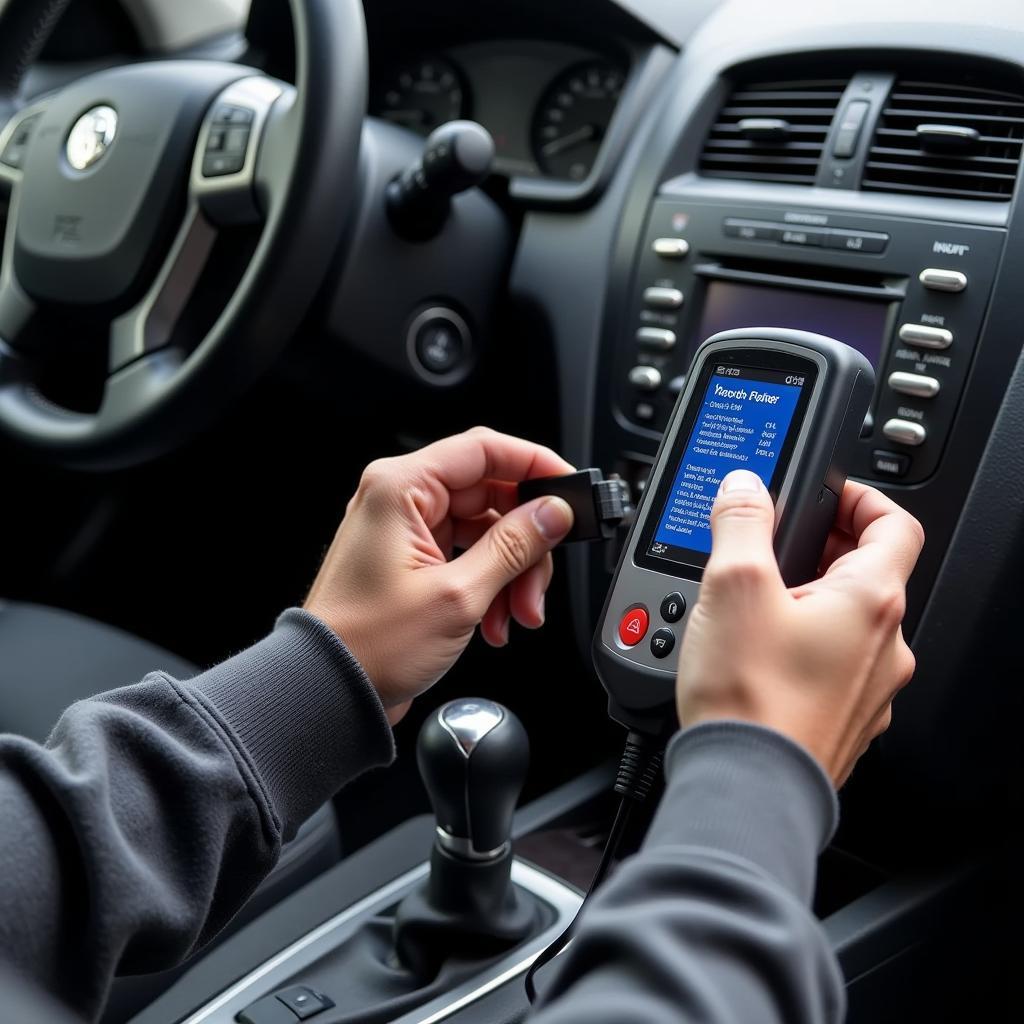Choosing the best car diagnostic tool can feel overwhelming with so many options available. This guide will break down everything you need to know, from understanding different types of diagnostic tools to choosing the perfect one for your needs, whether you’re a professional mechanic or a DIY enthusiast.
Understanding Your Diagnostic Needs
Before diving into the world of OBD-II scanners, code readers, and professional-grade scan tools, it’s crucial to assess your individual requirements. What are you hoping to achieve with a car diagnostic tool? Are you simply looking to check engine codes and reset the check engine light, or do you need more advanced functionalities like live data streaming, bi-directional control, and special functions?
Types of Car Diagnostic Tools
Basic Code Readers
These entry-level tools are ideal for retrieving and clearing basic diagnostic trouble codes (DTCs). They are affordable and user-friendly, perfect for DIYers who want to understand why their check engine light is on. However, they offer limited functionality and may not provide access to all vehicle systems.
OBD-II Scanners
OBD-II scanners offer more features than basic code readers, including the ability to view live data, freeze frame data, and monitor sensor readings in real-time. They are a good choice for car enthusiasts and DIYers who want more in-depth diagnostic information.
Professional-Grade Scan Tools
These high-end tools provide comprehensive diagnostic capabilities, including advanced functions like bi-directional control, special functions, and access to all vehicle systems. They are typically used by professional mechanics and automotive technicians. These tools can be quite expensive, but their functionality is unmatched.
Key Features to Consider
When selecting the best car diagnostic tool, consider the following factors:
- Vehicle Compatibility: Ensure the tool is compatible with your vehicle’s make, model, and year.
- Functionality: Determine the features you need, such as code reading, live data streaming, and bi-directional control.
- User Interface: Choose a tool with a user-friendly interface and intuitive navigation.
- Durability: Opt for a robust and well-built tool that can withstand regular use.
- Software Updates: Ensure the tool offers regular software updates to stay current with the latest vehicle technologies.
What is the Best Car Diagnostic Tool for Me?
The “best” tool depends entirely on your individual needs and budget. For occasional use and basic code reading, a simple code reader might suffice. For more advanced diagnostics, an OBD-II scanner is a good choice. Professionals require the comprehensive capabilities of a professional-grade scan tool.
 Using an OBD-II Scanner
Using an OBD-II Scanner
Top Car Diagnostic Tool Brands
Some reputable brands offering a range of car diagnostic tools include:
- Autel: Known for their high-quality and feature-rich scanners.
- Innotek: Offers a variety of affordable and user-friendly options.
- Launch: Provides a wide range of professional-grade scan tools.
- BlueDriver: A popular choice for its Bluetooth connectivity and mobile app integration.
“Investing in a reliable car diagnostic tool can save you time and money in the long run,” says John Miller, a certified automotive technician with over 20 years of experience. “It empowers you to understand your vehicle’s health and address potential issues proactively.”
Future Trends in Car Diagnostics
The field of car diagnostics is constantly evolving, with new technologies and innovations emerging regularly. Expect to see more integration with mobile devices, cloud-based diagnostics, and advanced features like predictive diagnostics.
Conclusion
Choosing the best car diagnostic tool requires careful consideration of your needs, budget, and desired functionalities. By understanding the different types of tools available and the key features to look for, you can make an informed decision and empower yourself to take control of your vehicle’s maintenance. Finding the right best car diagnostic tool is an investment in your car’s health and your peace of mind.
FAQ
- What is an OBD-II port? The OBD-II port is a standardized connector found in most vehicles manufactured after 1996, used to access diagnostic information.
- Can I use a car diagnostic tool on any car? Compatibility varies depending on the tool and the vehicle. Always check the tool’s specifications before purchasing.
- What are diagnostic trouble codes (DTCs)? DTCs are codes that indicate specific malfunctions within a vehicle’s systems.
- Do I need a professional-grade scan tool? Unless you’re a professional mechanic, an OBD-II scanner or code reader is usually sufficient.
- How often should I use a car diagnostic tool? Periodic checks are recommended, especially if you notice any unusual performance issues.
- Can a car diagnostic tool fix my car? No, it only identifies the problem. Repairs still need to be carried out.
- Where can I learn more about car diagnostics? Numerous online resources and forums offer valuable information.
Need further assistance? Contact us via WhatsApp: +1(641)206-8880, Email: [email protected] or visit us at 910 Cedar Lane, Chicago, IL 60605, USA. We offer 24/7 customer support.

Leave a Reply